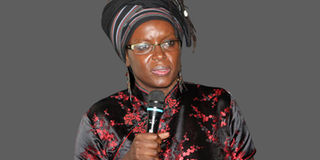Tamale: A passionate human rights activist

Sylvia Tamale
What you need to know:
About sylvia tamale
• Tamale holds a Bachelor’s degree in Law from MUK, a Master’s degree from Harvard Law School and a PhD in Sociology and Feminist Studies from the University of Minnesota.
• Dean of the Faculty of Law at Makerere University, from 2004-2008, she was the first female to hold the position.
• Founded and serves as coordinator of the Law, Gender & Sexuality Research Project, Makerere University.
• Guest lecturer at several universities, including Cape Town, Pretoria, Wisconsin and Zimbabwe.
• Awards won include: Inspirational African Feminists Award for being the first woman to hold the Dean of Law position at Makerere University in 2011, the University of Minnesota Distinguished Leadership Award for Internationals in 2003, African Studies Association International Visitors Award in 1999, a Fulbright-MacArthur Scholarship from 1993-1997, and Uganda Law Society Prize for the best performance at the Law Development Centre in 1990.
Sylvia Tamale chooses to defend the rights of those the public would rather not associate with and she does not do it in hiding, writes Gumisiriza Mwesigye
A few years ago, while presenting a paper on political independence and affirmative action for women at Makerere University, Dr Sylvia Tamale pointed out that the law on prostitution was unjust. “It targets only women, yet the business (prostitution) involves two parties; men and women. All sides should be penalised, it should not only be the women,” she said.
Like she has done many times before, Tamale once again maintained her stand on that contentious and emotive issue—homosexuality: “It involves two consenting adults who are aware of what they are doing.’’ She said that as long as gays did not infringe on anyone’s freedom, they should be allowed to do as they wanted.
It is such statements by which she has been quoted in the media that make it easy for people to misunderstand and misrepresent what Sylvia Tamale stands for. And in a society like Uganda where people get prickly over things that they either tend to avoid, not acknowledge or sweep under the carpet, anyone who draws attention to them will be perceived with caution and treated with suspicion.
Yet Tamale chooses to raise her voice on issues like the right of sex workers to earn a living, the right for adults to enjoy adult entertainment and leisure like ebimansulo (striptease shows), and the recognition of human rights for marginalised groups such as sexual minorities and refugees, addressing the injustices in the law. Her arguments? That as long as these minorities’ activities do not infringe on the freedoms and rights of others, they should be granted their right to freely do as they please.
This knack for tackling controversial issues has earned her the wrath of many. Others however, have looked beyond the nature of the topics she chooses to address and seen what she has achieved with her outspokenness on the forbidden subjects.
Her impact therein
This Associate Professor of Law at Makerere University has used her position to highlight such otherwise taboo issues through academic publications, presentations at conferences, media interviews, lectures at universities and mobilisation campaigns. In over 40 publications, she has covered subjects from gender equality, affirmative action, and religious extremism, women’s participation in politics, to refugees, racism, xenophobia, HIV/Aids and culture. Blending academia and activism, Tamale has influenced critical thinking at national and international levels as one of Africa’s leading feminist scholars.
When she was the Dean of the Faculty of Law at Makerere University, from 2004-2008, and a member of the University Senate, she was key in pressing for the Sexual Harassment Policy. With the subsequent implementation, it provided especially female students with a structure to report sexual harassment and a forum to seek redress. Sexual harassment is prevalent on campuses across Africa but often hushed up. But, with Makerere University being one of the first to have a policy in this regard, other African universities have followed suit.
On law reform, another issue that Tamale advocated for, another victory scored that has wide ranging implications and impact, was the inclusion of girls right to inheritance and removal of sections of the law on adultery that were biased against women.
Even though it seems like the home publics still largely do not know what to make of whether to like her or not, her efforts have in the meantime been noted and rewarded beyond home ground.
Pushing for open minded activism
To the activists who are selective in their approach to human rights, this is what Tamale had to say at a discussion on sexuality, feminism and the women’s movement in Zimbabwe : “We need to begin the process of unlearning the information that we have and start looking at things with an open mind.
There are activists who will say when it comes to sex workers or homosexual people ‘I’m sorry I will not deal with those’ yet they say they are human rights activists!” And indeed, even the traditionally segregated segments of society need representation and support, and Tamale has given them just that in her activism.




